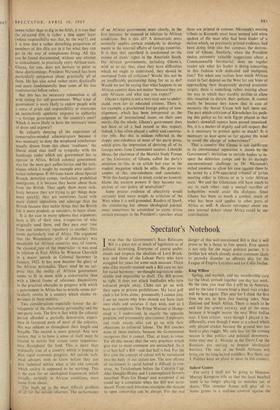Spectator's Notebook
IFEAR that the Government's Race Relations Bill is a piece not so much of legislation as of political skywriting. Everyone of course under- stands and respects the idealism of Lord Brock- way and those of the Labour Party who have struggled for years for some such measure. Those who (like myself) resisted such a Bill care no less for racial harmony : we thought legislation unde- sirable and impossible to draft. The Bill proves us right. It does not attack landladies who turn coloured people away. Clubs can go on with their open or private prohibitions. My local golf club is for Jews alone : presumably I cannot join. I see no reason why Jews should not have their own clubs and societies if they wish, and so I have no complaint. The Prime Minister at Hamp- stead is, I understand, in exactly the opposite position, and presumably also content. Employers and trade unions alike can go on with their objections to coloured labour. The Bill touches none of these matters, because the Government recognises that it cannot. That, at least, is sense. Yet all this means that the very practices which give rise to most comment are untouched. So it is at best half a Bill--and that half is bad. For the first time the concept of colour will be introduced into the body of our statute law. The new offence of incitement to racial hatred is difficult to con- strue. At Twickenham before the Calcutta Cup, Alec Douglas-Home and I contemplated banners inscribed 'Picts Go Home' and wondered if we - could lay a complaint when the Bill was intro- duced. From such frivolous examples the descent to open censorship can be abrupt. For the real
danger of this well-intentioned Bill is that it will prove to be a threat to free speech. Free speech is not only for the major political parties. It is (within law which already makes comment likely to provoke disorder an offence) also for the League of Empire Loyalists and for Colin Jordan.






























 Previous page
Previous page